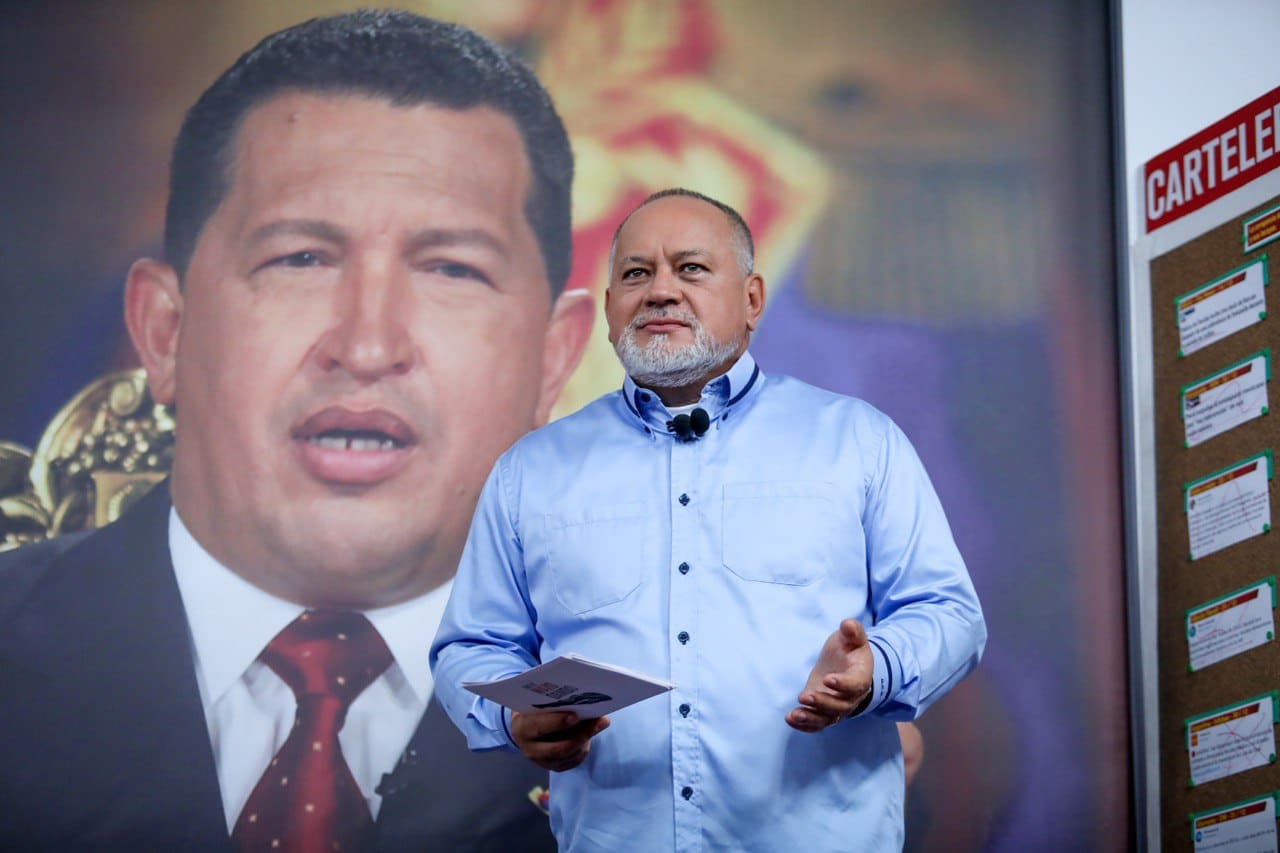
PSUV Deputy Diosdado Cabello. Photo: Con el Mazo Dando/File photo.

Orinoco Tribune – News and opinion pieces about Venezuela and beyond
From Venezuela and made by Venezuelan Chavistas

PSUV Deputy Diosdado Cabello. Photo: Con el Mazo Dando/File photo.
This Wednesday, January 11, the first vice president of the United Socialist Party of Venezuela, Diosdado Cabello, stated that the salary of Venezuelan workers is the main concern of President Nicolás Maduro. During his program Con el Mazo Dando, the Chavista leader questioned the proclamations of opposition sectors of the country regarding the recent protests led by a group from the education sector that demand better salaries.
“Some gentlemen came out there talking about their support for the protests,” he said, “but when the government was theirs, they endorsed the human rights violations that were committed against workers when they went out to protests and demanded better wages.” He criticized the fact that these political opposition sectors ignore the economic difficulties that US and European illegal sanctions—that have the support of the radical sector of the Venezuelan opposition—have meant for Venezuela.
Freddy Bernal: Venezuela to Propose Sustainable Salary Increase
“There is a reality that people like (Óscar) Figuera (general secretary of the Communist Party of Venezuela) do not want to see that there are sanctions,” Cabello said, “and that with their speeches they have become agents of imperialism.” The PSUV leader added that the stand taken by the communist leader “is disgusting,” and maintained that Venezuela is the only country where the leadership of a communist party “defends the right and imperialism.” He noted that the salary issue in Venezuela has been a permanent concern for President Maduro.
“If anyone in this country is concerned about the salary of Venezuelans, it is President Nicolás Maduro. There is no meeting where the president does not look for alternatives to guarantee workers’ wages,” he stated, recalling that as a consequence of the “sanctions” policy imposed by the United States, the country’s income reached almost zero, which has affected the government’s capacity for dealing with salary and investment issues. “For every $100 we should be receiving, we only receive one,” he explained, “and of course things have improved, but by a little. It’s not that we are receiving 20, no, but we are improving and it will continue to improve.”
Venezuela: Rentier Capitalism and the Project for Change (Part 1)
Regional alert
Cabello also referred to recent acts of violence carried out by followers of Jair Bolsonaro, who tried to storm the institutions of the Federal State of Brazil. He accused the United States government of being part of these actions, noting that “imperialism would be better off with a Bolsonaro than a humanist like Luiz Inácio Lula da Silva.”
“President Lula has been [in power] in Brazil for a week,” he added, “and suddenly some sympathizers of former President Bolsonaro decided to take power and failed. And after they failed [the US] went out to show solidarity with Lula and the people, but if they had been successful, they would surely have said that the democratic channels are functionary and therefore the president had to resign because the people had demanded it in the streets. That would have been the discourse of the United States.”
Lula Restores Order After Rabid Bolsonaro Supporters Storm Brazil’s Capital
Cabello reiterated that what has happened in Perú is a coup against President Pedro Castillo, and repudiated the massacre promoted by the current de facto government of Dina Boluarte in the face of the demonstrations taking place in this nation. “In Perú, what happened is a massacre,” he stated. “They gave Castillo a coup d’état, whom [they] are not going to defend because he made many mistakes, and the de facto government has already had more than 40 murders that are known, and the OAS does not say anything, the Inter-American court does not say anything, the Criminal court says nothing.”
Cabello drew attention to the fact that—in addition to what happened in Perú and Brazil—in Bolivia, right-wing sectors tried to promote destabilizing actions with protests that were dissipated with the arrest of governor Luis Fernando Camacho, who is accused of his participation in the coup against then-president of Bolivia, Evo Morales. “Everyone said that when Camacho was put in jail, the country was going to burn down,” he noted, “but it was Camacho who wanted to set the country on fire. Justice acted and the country is already calm.”
Perú’s Prosecutor’s Office Initiates Preliminary Investigation Against Boluarte for Genocide
Cabello also criticized the fact that when these extremist right-wing leaders are the subject of legal actions, they use alleged health conditions to evade justice. “Bolsonaro has said that he is sick there in the United States. Those on the right, when they know that justice is looking for them, they get sick with anything,” he pointed out. “Camacho also got sick. That reminds me here of (Antonio) Ledezma and many others who played dying.”
(Últimas Noticias) by Jesús Inojosa
Translation: Orinoco Tribune
OT/JRE/AU